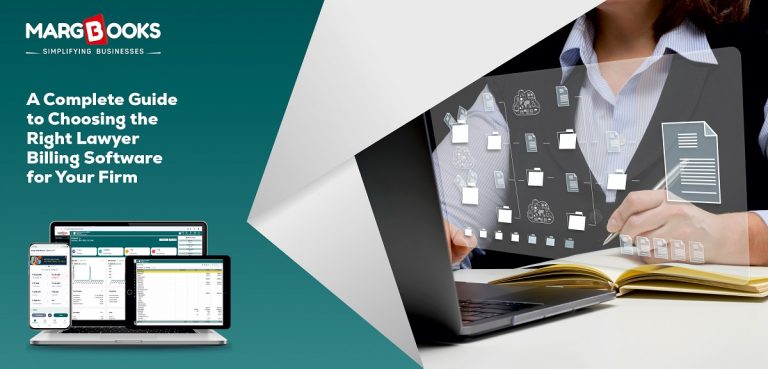When it comes to running a law firm, efficiency and accuracy in financial management are key. One of the most important aspects of managing a legal practice is ensuring that billing and invoicing are streamlined and transparent. Enter lawyer billing software, a tool designed to simplify the billing process, reduce errors, and save valuable time.
However, with so many options available in the market, choosing the right lawyer billing software for your firm can be overwhelming. To help you make an informed decision, this guide will walk you through everything you need to know about selecting the ideal billing software, with a special focus on the benefits of online billing software and cloud-based accounting software.
Why is Lawyer Billing Software Essential for Your Firm?
Law firms handle multiple cases at once, and each case has its unique billing needs. Whether you bill hourly, on a retainer, or by fixed fees, using the right software ensures that you can:
- Track billable hours: Accurately track the time spent on each case, which is crucial for accurate billing.
- Generate professional invoices: Customize invoices to meet the specific needs of your clients and the legal industry.
- Ensure compliance: Some jurisdictions have specific billing and timekeeping regulations, and the right software helps you stay compliant.
- Improve client satisfaction: Transparent billing creates trust and helps in maintaining positive client relationships.
Key Features to Look for in Lawyer Billing Software
To choose the best lawyer billing software, you need to consider the key features that will cater to your firm’s specific needs. Here are the most essential ones:
1. Time Tracking & Billing
The primary function of lawyer billing software is to simplify time tracking and bill clients accurately. The software should offer:
- Automatic time tracking: Integrates with your calendar or communication tools to track time as you work.
- Billable vs. non-billable hours: The software should clearly distinguish between time that can be billed and time that cannot.
- Multiple billing methods: Whether you charge hourly, flat fees, or contingency fees, your software should accommodate all billing methods.
2. Invoicing & Payment Management
The ability to generate professional, customisable invoices is crucial for any law firm. Look for a cloud-based accounting software solution that offers:
- Custom templates: You should be able to customize invoices with your firm’s branding, logo, and standard terms.
- Flexible payment options: Enable clients to pay via different payment methods, including credit/debit cards, net banking, or UPI (Unified Payments Interface).
- Automatic reminders: Schedule reminders for overdue payments to avoid chasing clients manually.
3. Integration with Accounting Software
Law firms need to maintain accurate financial records. Therefore, having integration between your lawyer billing software and accounting systems is essential for tax compliance and smooth financial operations.
- Expense tracking: Easily record your expenses, including office supplies, client-related costs, and other administrative expenses.
- Tax calculations: The software should automatically calculate applicable taxes and apply them to your invoices.
- Financial reporting: Generate detailed reports to get insights into your firm’s financial health, including income, expenses, and profitability.
4. Security & Data Protection
As a law firm, you deal with sensitive client data. Hence, robust security features are a must for any online billing software you choose.
- Data encryption: Ensure that the software encrypts all client and financial data to prevent unauthorized access.
- Backup features: Choose software that regularly backs up your data, so you don’t lose crucial information.
- Role-based access control: This allows only authorized personnel to access sensitive financial or client information.
Why Choose Online Billing Software or Cloud-Based Accounting Software?
Both online billing software and cloud-based accounting software offer distinct advantages over traditional desktop solutions. Here’s why you should consider them:
1. Access Anywhere, Anytime
With cloud-based accounting software, you can access your billing software from any device with an internet connection, whether you’re at the office, in court, or working from home. This flexibility is especially helpful for firms with multiple locations or remote teams.
2. Real-Time Updates
Cloud-based solutions provide real-time updates, meaning you and your team always have access to the latest information. This is particularly important in the legal industry, where billing needs can change rapidly based on case progress and client requirements.
3. Collaboration Made Easy
Cloud-based systems facilitate easy collaboration between team members. Multiple users can access the same files simultaneously, making teamwork more efficient. Additionally, role-based access allows you to grant specific permissions based on staff responsibilities.
4. Scalability
As your firm grows, so will your needs. Cloud-based software scales with your business, enabling you to add more users, handle more cases, and even incorporate additional features without the hassle of upgrading hardware or installing new software.
5. Cost-Effectiveness
With online billing software, you save on IT maintenance costs, server hosting, and hardware upgrades. Most cloud-based solutions operate on a subscription model, offering flexibility to choose plans according to your firm’s size and needs.
What to Consider Before Choosing Your Lawyer Billing Software
Before you commit to any software solution, take the time to evaluate your firm’s specific needs. Consider the following factors:
1. Firm Size
- Solo practitioners: If you’re a sole practitioner or operate a small firm, choose software that offers simplicity and ease of use at an affordable price.
- Larger firms: For bigger teams, select a solution with advanced features like multi-user support, case management, and deep financial reporting.
2. Ease of Use
Your team should be able to learn the software quickly. Look for online billing software that has an intuitive user interface and provides training materials or customer support.
3. Customer Support
Good customer support is essential. Opt for a provider that offers 24/7 support, especially if you work with clients across different time zones.
4. Trial Period or Demo
Many software providers offer free trials or live demos. Make use of this opportunity to test the software’s features and determine if it meets your firm’s needs.
Conclusion
Choosing the right lawyer billing software for your firm is a critical decision that impacts your efficiency, client satisfaction, and overall financial health. Whether you opt for cloud-based accounting software or online billing software, ensure that the solution you choose aligns with your firm’s billing requirements, security standards, and scalability needs.
For law firms looking for an all-in-one solution, Margbooks offers a versatile platform designed specifically for the legal industry. With its advanced time tracking, invoicing, and accounting features, Margbooks ensures that your firm stays organized and efficient, allowing you to focus on what matters most delivering excellent legal services to your clients.
By evaluating your firm’s needs and keeping these factors in mind, you can select the best lawyer billing software that will streamline your processes and improve your financial management.




